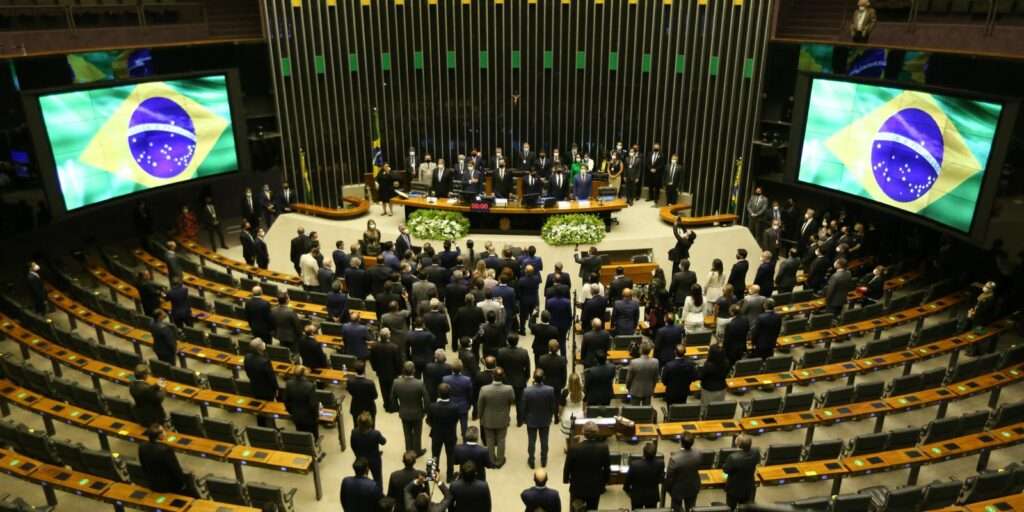
Brazil’s lawmakers to vote on ‘fake news’ bill opposed by tech groups.
Critics decry measures as draconian and open to abuse by special interests.
Brazil’s lawmakers to vote on ‘fake news’ bill opposed by tech groups on twitter (opens in a new window)
Brazil’s lawmakers to vote on ‘fake news’ bill opposed by tech groups on facebook (opens in a new window)
Brazil’s lawmakers to vote on ‘fake news’ bill opposed by tech groups on linkedin (opens in a new window)
Brazil’s lawmakers to vote on ‘fake news’ bill opposed by tech groups.

Brazil’s Congress is poised to vote on contentious legislation to curb the spread of “fake news”, which has drawn opposition from Google and other tech groups facing tougher laws governing their content globally.
Parliament is expected in the coming week to vote on the measure being pushed through at speed by the government led by President Luiz Inácio Lula da Silva.
It aims to tackle the spread of misinformation, but critics decry it as draconian, rushed and open to abuse by special interests.
The law would impose strict requirements on how tech companies deal with illegal and other damaging content, as well as punishments for groups that spread falsehoods at scale using robots or artificial intelligence.
It has drawn a sharp backlash from a diverse coalition, including the lobby group for tech companies such as Google and Meta, free speech advocates and members of the far right. They variously argue that the bill may lead to censorship and is being rushed through.

“Hasty legislation can make the internet work worse, restrict fundamental rights . . . and create mechanisms that put legitimate speech and freedom of expression at risk,” said Marcelo Lacerda, of Google Brazil, in an online post.
The shift in Brazil — one of the world’s biggest social media markets, with about 165mn users, according to data company Statista — comes as digital platforms face new laws governing their content globally, with requests by more authoritarian governments presenting regulatory dilemmas. In India, critics of internet laws announced in 2021 argue that they will force platforms to take down content deemed contentious by New Delhi.
Turkish social media laws have faced similar criticism, while some platforms have taken down content from dissidents in Vietnam and Thailand at the behest of their countries’ governments.
The orchestrated spread of misinformation on social media and messaging apps such as WhatsApp became prominent in Brazil during the 2018 election campaign of Jair Bolsonaro and his subsequent presidency. Some researchers argue that fake news about vaccines and other health measures led to thousands of extra deaths during the Covid-19 crisis.

Concern over the issue was reignited in January when thousands of supporters of the former president raided and vandalised the country’s political institutions in Brasília. Many rioters repeated falsehoods spread in far-right chat groups that the election in which Bolsonaro lost to Lula in October was rigged. Lula and his supporters called the unrest an “attempted coup”.
Orlando Silva, the lawmaker designated to present the bill, said: “In Brazil fake news reigns in politics. It is behind the fall in vaccinations, the surge in attacks on schools and the attempted coup. [We] need to change the regime of responsibilities of digital platforms.”
Alencar Santana, a lawmaker with Lula’s Workers’ party, said: “[Fake news] is a complex phenomenon, but the bill will help us as a society to fight this problem . . . its approval is urgent.”
At the heart of the legislation, which is still subject to change, are requirements for tech companies and social media platforms, including a legal obligation to flag and remove criminal content.
The law would also hold platforms responsible for damage caused by paid content, with potential fines if they did not quickly comply with court orders to remove posts.

Users and groups that spread misinformation at scale through automated accounts in so-called fake news factories could be held criminally liable. The bill sets out what might constitute illegal content, including crimes against “the democratic state of law, acts of terrorism, crimes of racism [and] violence against women”.
Silva, a lawmaker with the Communist Party of Brazil, said: “[If] you disclose a fact that is known to be untrue, that causes damage, and you knowingly use robots and fake news factories, this will be considered a crime with punishments including imprisonment.”
The legislation must be voted on by both houses of Congress before it can become law, a process that may take weeks.
Under pressure over censorship concerns, Silva has withdrawn a clause in the bill that would have created a government-run agency to regulate internet platforms.
“The bill creates the possibility the government could abuse its power, raising legitimate concerns about accountability in situations where dissent and opposition to the government are involved,” said Bruna Santos, director of the Brazil Institute at the Wilson Center, a think-tank.
Critics have rounded on a clause offering immunity to elected politicians over online posts.
Lawmakers defend the measure as a way to safeguard political freedoms in a country that between 1964 and 1985 was ruled by a military dictatorship. Opponents say it is a concession to far-right lawmakers, who claim they could be targeted.

“The parliamentary immunity gives a privileged position to politicians, who are the main spreaders of [fake news],” said Patrícia Campos Mello, author of a book on far-right misinformation in Brazil.
Until now, misinformation cases have mostly been handled on an ad hoc basis by the country’s electoral court.
The plenary vote comes days after Congress voted to speed the bill’s passage by skipping committee hearings.
It has the backing of the government and Arthur Lira, the powerful head of the lower house, so analysts expect the legislation to pass, though potentially with major changes.
Source: Financial Times.
Richard Koomson| mediacentralonline.info |Ghana
kindly send us your stories on our WhatsApp line 0500004727






